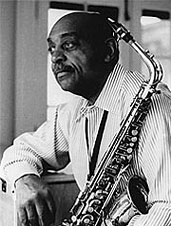

  |
|
|
||||||||||||||||||||||
|
FMS FEATURE ARTICLE... July 14, 2003 Music Legend Benny Carter Dead at 95 Jazz composer, arranger, musician was major contributor to film, TV by Jon Burlingame  Primarily self-taught, Carter began his love for music on the trumpet but soon shifted to the alto saxophone. By the time he joined Fletcher Henderson's band in 1930, he was already writing arrangements. He was a staff arranger for the BBC dance orchestra in the late 1930s, returned to the U.S. to form his own band and played at Harlem's Savoy Ballroom in 1939–40. Carter permanently settled on the West Coast in 1942 where he became one of the first African American composers to write for films and TV. Carter wrote arrangements for several films, mostly at 20th Century-Fox, including the classic musical Stormy Weather (1943); composed key sequences in Panic in the Streets (1950); and made on-screen appearances in The Snows of Kilimanjaro (1952) and The View from Pompey's Head (1955). He can also be glimpsed in the M-G-M Gershwin cavalcade An American in Paris (1951). Carter composed complete scores for the Sammy Davis Jr. film A Man Called Adam (1966) and Sidney Poitier's Buck and the Preacher (1972). He also scored several animated shorts for John and Faith Hubley, including Adventures of an * (1957), Harlem Wednesday (1958), The Cruise (1966), Urbanissimo (1967) and The Cosmic Eye (1986). But his steadiest employment as a composer came in television. Carter was the very first African American to achieve screen credit as a composer in TV, on a November 1958 episode of the Lee Marvin police drama M Squad. In 1993, Carter recalled: "I did a date that John Williams was scoring. I was just a musician on the date, the soloist. That was the first time I met [Revue music director] Stanley Wilson. And after the thing was over, he said to me, `Would you like to do a show or two for us?' And I said, `Indeed I would, thanks for the opportunity.' It started there. After I did one or two they offered me a contract." By the spring of 1959, Carter was the sole composer on M Squad. He scored 16 episodes of the 1958-59 season and all 39 of its 1959-60 season, helping to create the quintessential "detective jazz" sound that would accompany so many cop and private-eye shows for the next decade. A third of the music on the 1959 M Squad soundtrack and all of the alto saxophone solos are Carter's. Throughout the 1960s and into the early 1970s, Revue (later Universal Television) became Carter's second home. He scored one of the first television movies ever made, The Hanged Man (1964), and in the process wrote one of his biggest hits: "Only Trust Your Heart" (with lyrics by Sammy Cahn), performed in the film by Stan Getz and Astrud Gilberto. Carter also scored the pilots for two of Universal's most successful series, The Name of the Game"(Fame Is the Name of the Game, 1966) and It Takes a Thief (The Magnificent Thief, 1968), although he didn't get to write the series theme for either one. Carter scored 16 episodes – more than any other single composer – of The Bob Hope Chrysler Theatre (1963-67), television's last great dramatic anthology series. Notable among them was Something About Lee Wiley, a biography of the jazz singer that starred Piper Laurie. He also scored episodes of The Investigators (1961), Ironside (1967-70), The Name of the Game (1968-70), The Bold Ones (1970) and Rod Serling's Night Gallery (the Serling-penned classic "They're Tearing Down Tim Riley's Bar," 1971). © 2003 Jon Burlingame |
Search
Past Features
|